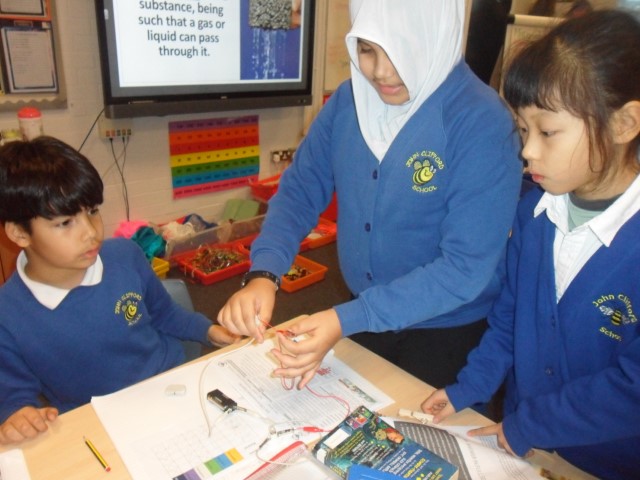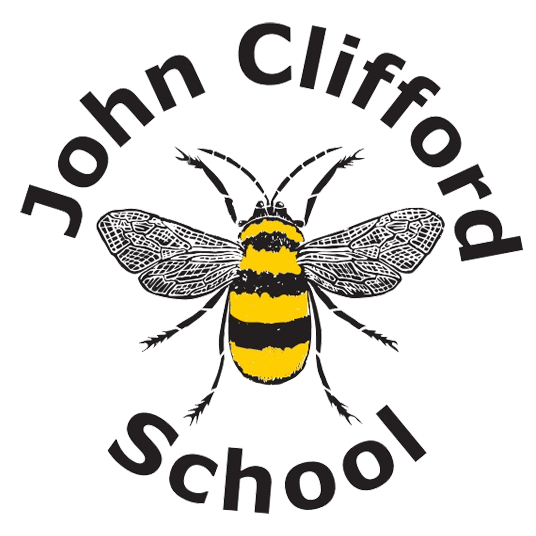Why do we teach Science at John Clifford School?
At John Clifford we work hard to provide a rich and varied Science Curriculum to challenge and meet the needs of our children. Our vision is to instil a lifelong love of science within all our children, which will provide them with a strong understanding of the world around them. Our core belief is to develop a sense of excitement and curiosity about natural phenomena which will give them an understanding of the uses and implications of Science today and for the future. Through our curriculum we strive to advance our children’s understanding of the nature, processes and methods of science through different types of science enquiries that help them to answer scientific questions about the world around them. During their learning journey we expect them to acquire specific skills and knowledge to help them to think scientifically, gain an understanding of scientific processes, knowledge and conceptual understanding.
We ensure that all children are exposed to high quality teaching and learning experiences, topics are revisited and developed throughout their time at school.
Learning is built upon their prior knowledge. Throughout our children’s learning we make sure that the Working Scientifically skills are built-on and developed throughout the children’s time at our school. At John Clifford, we recognise the importance that lessons should have a skills-based focus and include a range of skills including observations, planning and investigations and encourage our children to increasingly become independent learners.
Our children are allowed to explore their outdoor environment and locality, thus enabling them to question the immediate world around them as well as developing their respect for living and non-living things. Our Science Curriculum helps to foster a healthy curiosity in children about our universe and promotes curiosity throughout their time at John Clifford and beyond.
From EYFS up to KS2 our pupils are immersed in scientific vocabulary, which aids our children’s knowledge and understanding not only of the topic they are studying, but of the world around them. We provide all our children with wider opportunities in science and make links to other subjects. The progress of our children is monitored regularly in science in line with our science policy.
How do we teach Science at John Clifford School?
Our intention is to create a positive attitude to the teaching and learning of science throughout our school and reinforce an expectation that all our children are capable of achieving high standards in science. To ensure these high standards, we implement a curriculum that is progressive throughout the whole school.
Planning for science is a process in which all our teachers are involved in to ensure that the school gives full coverage of, ‘The National Curriculum programmes of study for Science 2014’ and, ‘Understanding of the World’ in the Early Years Foundation Stage.
Our whole school approach to the teaching and learning of science involves the following;
- Science is taught consistently, once a week for up to two hours, but is also discretely taught in many different contexts throughout all areas of the curriculum;
- Science teaching at John Clifford involves adapting and extending the curriculum to match the needs all our children;
- Our curriculum is created to prepare our children for life in an increasingly scientific and technological world today and in the future;
- Planning involves teachers creating engaging lessons, often involving high quality resources to aid understanding of conceptual knowledge;
- Science is taught in planned and arranged topic blocks and where possible has a project-based approach, making links to other curriculum areas;
- Mathematical concepts are taught through science, especially data collection, data presentation and interpretation;
- Through our planning, we involve problem solving opportunities that allow our children to find out for themselves;
- We build upon the learning and skill development of the previous years;
- We use questioning to test conceptual knowledge and skills, and assess children regularly to identify those children with gaps in learning;
- Children are provided with regular opportunities to develop strategies for questioning and thinking;
- Working Scientifically skills are embedded into lessons to ensure these skills are being developed throughout the children’s time at John Clifford.
- New vocabulary and challenging concepts are introduced through direct teaching;
- Children are taught how to use scientific equipment safely and correctly by teacher demonstration;
- Opportunities are found to enhance children’s understanding of their surroundings by the organisation of trips, accessing outdoor learning and visits by experts;
- Regular events, such as Science Week or WOW days allow all children to come off-timetable in order to provide broader provision and the acquisition and application of knowledge and skills;
- Low stakes quizzes are used which test and support children’s ability retrieve information from their memory;
- Teachers use assessment for learning to tailor lessons around our children and help us plan for next steps;
- Regular monitoring shows that our children understand and apply key scientific principles within their work.
Teaching Science in the EYFS
Science at Foundation Stage is covered in the ‘Understanding the World’ area of the EYFS Curriculum. It is introduced indirectly through activities that encourage every child to explore, problem solve, observe, predict, think, make decisions and talk about the world around them.
During their first years at school our children will explore creatures, people, plants and objects in their natural environments. They will observe and manipulate objects and materials to identify differences and similarities. They will also learn to use their senses, feeling dough or listening to sounds in the environment, such as sirens or farm animals. They will make observations of animals and plants and explain why some things occur and talk about changes. Children will be encouraged to ask questions about why things happen and how things work. They might do activities such as increasing the incline of a slope to observe how fast a vehicle travels, or opening a mechanical toy to see how it works. Children will also be asked questions about what they think will happen to help them communicate, plan, investigate, record and evaluate findings.
What are the outcomes for our children?
We are working very hard to develop and implement a Science Curriculum of high quality, which is well thought out and is planned to demonstrate progression and ensure that our children acquire the appropriate age related knowledge, linked to the science curriculum. The hard work teachers have put in has resulted in providing our children with a fun, engaging, high-quality science education, this equips our children with the foundations and knowledge for understanding the world as well as also skills which enable them to make progression.
Overwhelmingly, our children enjoy science and this results in enthusiastic and well-motivated learners with increasingly sound scientific understanding.
We measure the impact of our Science Curriculum through the following methods;
- A reflection on standards achieved against the planned outcomes;
- Pupil discussions about their learning;
- Tracking of knowledge in pre and post low stake learning quizzes;
- Frequent, continuous and progressive learning outside the classroom which is embedded throughout the science curriculum.
- A clear progression of children’s work and teachers’ expectations exists in our school;
- Our children’s work shows a range of topics and evidence of the curriculum coverage for all science topics;
- As children progress up the school they increasingly become independent in science, they are able to select their own tools and materials, complete pupil lead investigations and can choose their own strategies for recording.
- Verbal feedback from teachers has impact on our children, precise questioning promotes their learning.
- Standards in science at the end of the key stages are good and any concerns and issues arising are addressed effectively in school.

![]() The National Curriculum for Science
The National Curriculum for Science

